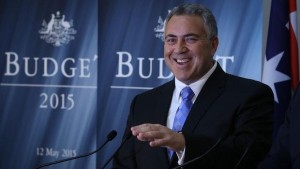The good, the bad and the ugly – how the 2015-16 Federal Budget shapes up
 The 2015-16 Federal Budget brings good news and bad news for both the migration and humanitarian sectors and the broader Australian community.
The 2015-16 Federal Budget brings good news and bad news for both the migration and humanitarian sectors and the broader Australian community.
Ten billion dollars for young families and small business are the central pillars of the federal government’s spending blueprint dubbed the ‘have-a-go budget’ by Treasurer Joe Hockey.
And even with $2 billion dollars of cuts to health spending over five years, this budget is devoid of the harsh spending cuts which characterised last year’s.
It represents the coalition’s attempt to repair its damaged political stocks while providing an impetus to the demand side of a stalling economy by giving small business spending power through tax concessions.
Humanitarian and settlement agencies have welcomed some measures to improve settlement outcomes for newcomers to Australia.
The budget contains funding worth almost $150 million for settlement services and the provision of extra funding to the Adult Migrant English program (AMEP) to extend English language tuition to holders of temporary humanitarian visas for one year.
An extra $14.5 million in the coming financial year will expand the Adult Migrant English program to include refugees who hold temporary substantive visas.
This means the program will provide 510 hours of English language tuition to those now eligible.
There is an extra $22.1 million in funding – part of the Youth Employment Strategy within the Government’s new ‘Growing Jobs and Small Business’ package – over four years to support young people from refugee backgrounds and other vulnerable young migrants to build skills and confidence to equip them to participate in education or work.
The Settlement Services allocation within the Department of Social Services (DSS) budget includes current Humanitarian Settlement Services (HSS), Settlement Grants and National Accreditation Authority for Translators and Interpreters (NAATI) services, as well as grants for peak bodies. Total funding for this area in 2015-16 will be $149.5 million, an increase of $7.4 million on 2014-15.
The budget provides for a continuation of the 13,750 refugees Australia accepts each year through its Humanitarian Program but this will rise to 16,250 in 2017-18 and 18,750 in 2018-19.
A total of $39.9 million has been allocated over four years for “anti-people smuggling strategic communications campaigns”, both in Australia and overseas.
The government has also allocated: $389.6 million over two years to fund resettlement arrangements for refugees in Nauru, PNG and Cambodia; $164.8 million over four years to upgrade border protection at airports, including the rollout of eGates, additional training for Australian Border Force officials; and, $4.7 million in the coming financial year to station Australian Border Force agents in Indonesia, Malaysia and Sri Lanka.
The government also says it will make savings through changes to the migration agents registration system and the consolidation of the immigration detention network.
Treasurer Joe Hockey said “unnecessary detention centres” such as Phosphate Hill and Construction Camp on Christmas Island, as well as Blaydin Point in Darwin, would be closed – saving $554.5 million over five years.
The government will also save an estimated $1.8 million in departmental expenses by removing the need for lawyer migration agents to be registered under the migration agents’ regulatory scheme.
Australians and new Australians will soon face new passport fees under measures outlined in the budget which outlines plans to impose separate fee categories for emergency passports and increased fees for priority processing.
The Abbott Government is set to adjust the visa application charge from July, and move to “full cost recovery” for citizenship costs from January 1. It is expected to raise $437.1 million over four years.
Australia’s 2015-16 Migration Program will remain at 190,000 places, with 128,550 allocated to the skilled stream, 60,885 to the family stream 565 under special eligibility.
But the changes to the family stream proposed in the 2014-15 budget, in which additional partner and child places would be made available as a result of the abolition of non-contributory parent visas and a range of other family visas, have been abandoned.
Aid agencies have criticised the $1 billion cuts to Australia’s foreign aid program announced in the budget which now amount to $11 billion since the coalition was elected.
Other key budget measures include:
- $642 million to fight cancer, including new melanoma and breast cancer drugs
- $30 a fortnight extra for 170,000 eligible pensioners
- 90,000 part-pensioners stripped of some of their pension
- $300 million in emergency funding for drought-stricken regional communities
- $40 billion over for years on a ‘jobs-for-families’ package
- $35 billion on defence and $1.2 billion on national security
- GST to apply to digital downloads
- FBT tax benefits to not-for-profit staff members to be tightened
- $50 billion to improve road and rail infrastructure
Laurie Nowell
AMES Senior Journalist












